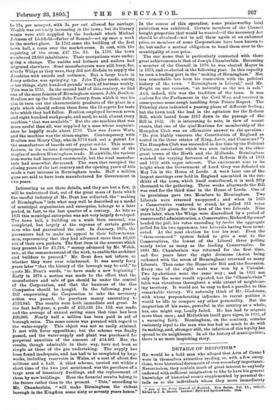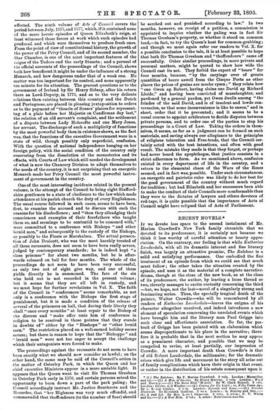DETAILS OF DESPOTISM.* HE would be a bold man who
alleged that Acts of Comic I were in themselves attractive reading, or, with a few excep. tions, were historical documents of even secondary importance. Nevertheless, they contain much of great interest to anybody endowed with sufficient imagination to like to have his general knowledge of historical events supplemented by personal de- tails as to the individuals whom they more immediately
• Acts of the Privy Council of England. New aeries, Vol. IX., 1575-77.. Edited by.!. It. Daiient. London: Byre and spettaiwoodie. 1894. affected. The ninth volume of Acts of Council covers the period between July, 1575, and 1577, which, if it contained none of the more heroic episodes of Queen Elizabeth's reign, at least witnessed those forces at work which such episodes had produced and which were themselves to produce fresh ones. From the point of view of constitutional history, the growth of the power of the Privy Council, and of its second member, the Star Chamber, is one of the reost important features of the reigns of the Tudors and the early Stuarts ; and a perusal of the official accounts of the proceedings of the Council, shows both how beneficent it might be under the influence of a strong Monarch, and how dangerous under that of a weak one. No matter was too important for its control, and none apparently too minute for its attention. The gravest questions as to the government of Ireland by Sir Henry Sidney, after his return there as Lord-Deputy, in 1775, and as to the very delicate relations then existing between this country and the Dutch and Portuguese, are placed in pleasing juxtaposition to orders as to the payment of "thearle of Sussex' plaiers for represent- ing of a plaie before her M.ajestie on Candlemas day last," the relation of an old servant's complaint, and the settlement
of a dispute between Lady Holcrofte and one Mary Jones, her servant. The discharge of such a multiplicity of functions by the most powerful body then in existence shows, as the fact was, that the functions of the executive Government were in a state of wild, though possibly only superficial, confusion. With the question of national independence hanging on her foreign policy, with the social condition of the country only reeovering from the dissolution of the monasteries and its effects, with Courts of Law which still needed the development of what is now the Chancery Division to adapt themselves to the needs of the country, it is not surprising that an energetic Monarch made her Privy Council the most powerful instru- ment of government in the country.
One of the most interesting incidents related in the present volume, is the attempt of the Council to bring eight Stafford- shire gentlemen to a state of obedience to the law which made attendance at his parish church the duty of every Englishman. The usual course followed in such cases, seems to have been, first, to examine the accused and to discuss with each the reasons for his disobedience ; and "then they alleadging their consciences and examples of their forefathers who taught them so, and seeminge to be contentid to be comoned with," were committed to a conference with Bishops "and other lernid men," and subsequently to the custody of the Bishops, or possibly to the Fleete or Marshalsea. The actual persecu- tion of John Draicott, who was the most harshly treated of all these recusants, does not seem to have been really severe, judged by contemporary standards ; he is indeed kept "a close prisoner" for about two months, but he is after- wards released on bail for four months. The whole of the proceedings do not seem to have been very successful, LS only two out of eight give way, and one of them yields directly he is summoned. The fate of the six who hold out is not recorded in the present volume; but it seems that they are all left in custody, and we must hope for further revelations in Vol. X. The faith of the Council in " conferences " seems remarkable, as not only is a conference with the Bishops the first stage of punishment, but it is made a condition of the release of geveral of the prisoners on bail, that during their liberty they shall "once every monithe " at least repair to the Bishop of the diocese and "make offer unto him of conference in religion to be resolved in those pointes that they stande in dowbte of" either by the " Bisshope" or "other lernid men." The restriction placed on a well-earned holiday seems severe; but there is reason to hope that the "Bishoppe " and lernid men" were not too eager to accept the challenge which their antagonists were forced to make.
The proceedings against the recusants do not seem to have been exactly what we should now consider as lawful ; on the other hand, the same may be said of the Council's action in the matter of Osterley Park, in which the Queen and her chief executive Ministers appear in a more amiable light. It appears that the Queen went to visit Sir Thomas Gresham in Osterley Park early in 1576, and certain persons seized the opportunity to burn down a part of the park paling ; the Council accordingly instruct Mr. Justice Southcote and the Recorder, that "her Highness was very much offendid, and commaundid that thoffendours (to the number of four) should be serched out and punished according to law." In two months, however, on receipt of a petition, a commission is appointed to inquire whether the paling was in fact Sir Thomas Gresham's property, or whether it stood on common land,—in fact, to try the Queen's host for common-grabbing ; and though we must again refer our readers to Vol. X. for a possible conclusion to the tale, it is at least possible to hope that both Sir Thomas Gresham and " thoffendours " came off successfully. Other similar proceedings, in more private and personal matters, might be quoted to show how wide the Council cast its net. They forbid the export of " beare " for four months, because, "by the caryinge over of greate quantities of beere aswell from the Cinque Ports as other places the prices of graine are moche rysen; " they relate how "one Owen a.p Robert, having Blaine one David ap Richard Lloide," and having been convicted of manslaughter, and pardoned by a general pardon, yet Owen dwells among "the frindes of the said David, and is of insolent and lewde con- versacion, so that some inconvenience is like to ensue," and in short, order that it be prevented ; and it seems to be a usual course to appoint arbitrators to decide disputes between private persons, and to order one of the parties to stop his proceedings in a Court of Law. Taking the orders in them- selves, it seems, as far as a judgment can be formed on such materials, and saving always our allegiance to the principles of religious toleration and Free-trade, that the Council cer- tainly acted with the best intentions, and often with good result. The mistake they made is that they forgot, or perhaps had never heard the apophthegm, that justice consists in a strict adherence to form. As we mentioned above, confusion existed in every department of life in the country, and a return to the elemental chaos of the Wars of the Roses seemed, and in fact was, possible. Under such circumstances, an energetic and patriotic ruler was likely to do her best for the good government of the country without much regard for tradition ; but had Elizabeth and her successors been able to make the conduct of their Councils more comformable than they were to the dictates of lawyers and others devotees of red-tape, it is quite possible that the importance of Acts of Council might have eclipsed that of Acts of Parliament.



































 Previous page
Previous page